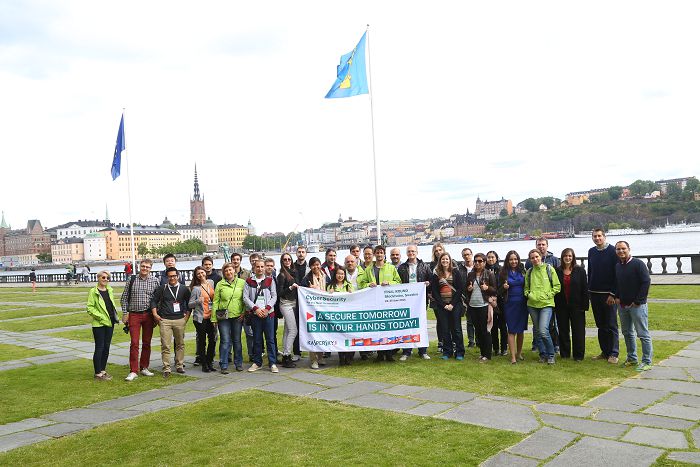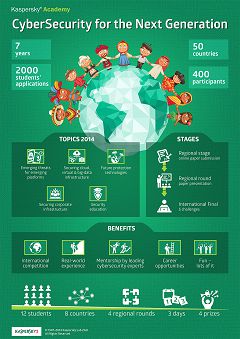Kaspersky Lab is delighted to announce the results of the final round of its international student conference CyberSecurity for the Next Generation 2014. The event took place on June 23-25, 2014 in Stockholm, Sweden, and brought together a group of talented students from all over the world.
Kaspersky Lab is delighted to announce the results of the final round of its international student conference CyberSecurity for the Next Generation 2014. The event took place on June 23-25, 2014 in Stockholm, Sweden, and brought together a group of talented students from all over the world.
Twelve students from eight countries – ranked top in the regional rounds of the conference – competed in a variety of unique cybersecurity challenges to test their mettle and prove they are ready to influence the future of IT security. In addition to the pre-set challenges, the contests included complex real-time tasks, a chance to demonstrate presentation skills as well as the ability to talk to a general audience on security-related topics – all of which are necessary for a successful IT security analyst.
The winner of the elevator pitch challenge was Maurizio Abbà from Eurecom, France. He impressed the program committee with a presentation of his paper ‘Web Honeypots 2.0: An Analysis of Exploitation Behaviors on the Web’. This challenge saw students prepare a short summary (no more than three minutes) of the research they had already presented in the regional round. The aim was to give a compelling talk on why someone should invest in their idea/research and what benefits it would bring.
The winner of the future news video reportage challenge was David Korczynski from Royal Holloway, University of London, UK. This challenge aims to test student creativity and communication skills in a fictitious scenario. They imagined the cybersecurity issues of 2020 and prepared a three-minute video clip for World News Today (WNT).
The winner of the poster session challenge was Artem Shumilov from the Bauman Moscow State Technical University, Russia. This session was all about promoting the research presented in the regional round by combining text, photographs, charts, graphs and other images into an eye-catching poster printout.
The same team won both team challenges – the cyber game ‘Operation Double-Cross’ and the cyber quiz. The winning team consisted of Sergey Shpak from the National Research Nuclear University MEPhI, Russia, Armando Miraglia from the Vrije Universiteit Amsterdam, the Netherlands, and Wenjuan Li from the Department of Computer Science, City University of Hong Kong.
Eugene Kaspersky, chairman and CEO of Kaspersky Lab, said: “The cyber domain is evolving at an astonishing pace and brings with it huge benefits. However, this technological progress means a lot of new dangers are created too. Cybercrime continues to spread, and nations are deploying sophisticated cyber-espionage tools and developing potentially devastating cyberweapons. The world is also now facing the very tangible risk of cyberterrorism. Our mission is to fight any cyber threat out there in the wild and make the Internet a safe and secure place. And that means not only thinking about current problems, but also looking to the future. We believe it’s vital to increase the effort that goes into training and educating the next generation of IT security specialists. So it’s been a great pleasure to see all these gifted students gathered together: the cream of the new cyber-generation! Congratulations to all the winners, in fact to everyone – there were no losers.”
CyberSecurity for the Next Generation 2014 included four regional rounds: the European Cup, the Russia & CIS Cup, the Asia-Pacific & MEA Cup and the Americas Cup. The winners of each round earned their place in the Final Round as well as cash prizes to help further develop their projects. This year’s topics were: emerging threats for emerging platforms; securing cloud, virtual and ‘big-data’ infrastructure; future protection technologies; securing corporate infrastructure; and security education.
CyberSecurity for the Next Generation is an annual international event financed and organized by Kaspersky Lab. This long-term project brings together students, young scientists and researchers, leading IT security experts and university professors from across the world in a collaborative environment to present and discuss topical cybersecurity issues.
For more information on CyberSecurity for the Next Generation and other Kaspersky Lab educational initiatives please visit:


